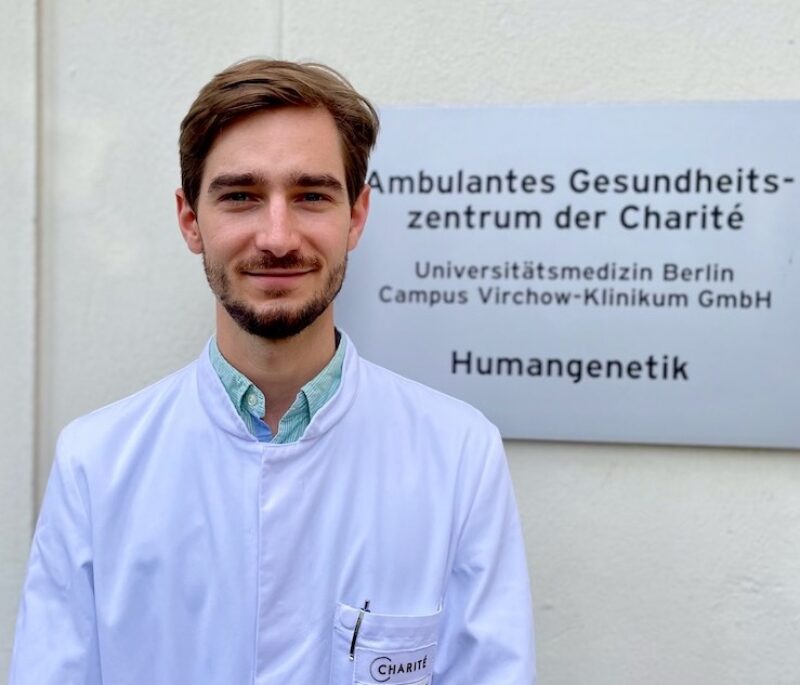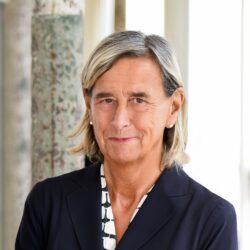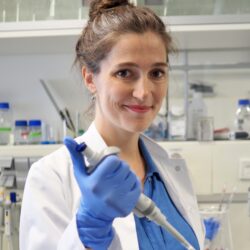Rare diseases affect children and adolescents in eight out of ten cases. Their participation in medical progress therefore depends crucially on dedicated pediatricians who are committed to the balancing act between bedside and laboratory. The Alliance4Rare research network initiated by the Eva Luise and Horst Köhler Foundation provides structured Clinician and Medical Scientist Programs (CS4RARE) to prepare researching paediatricians for this challenging task and to give them the necessary freedom for scientific work at a high level. The programs grant participants protected research periods in which they are released from clinical duties to advance scientific projects on rare diseases.
Dr. Boschann, you have been selected for the Alliance4Rare Clinician Scientist Program. What was the motivation for you to pursue this particular path in science and the clinic?
For me, human genetics is the cross-sectional subject in medicine, as we do not just deal with one organ system, but try to understand the molecular basis of various diseases. I am particularly fascinated by the close connection between clinical work and research.
We are in tight interdisciplinary contact with other specialist areas and look after patients of all ages. The issues I deal with in the clinic are very diverse. In recent years, there have been major technological advances in the field of genetic diagnostics. As a result, new disease genes and disease mechanisms are being decoded every year. We assume that up to 80% of the more than 7000 rare diseases known to date have a monogenic cause and that a further 6000 are still to be discovered. In addition, gene therapy strategies are currently being tested or have already been approved for more and more monogenic diseases. This raises the hope of not only being able to diagnose these rare diseases, but also to treat them effectively in the future.
What are you currently working on and what would you like to achieve?
My research focuses on hereditary connective tissue diseases. A special focus is on syndromic and familial aortic diseases. We are currently putting together a cohort of cases that have not yet received a molecular diagnosis, even though they have developed an enlargement or dissection of the aorta at a comparatively early stage. In these cases, we offer a genome and transcriptome analysis, i.e. we sequence a large part of the genome in addition to the 20,000 genes and look for deviations in gene expression.
The aim is to find new mutations in known genes that have not yet been detected using conventional diagnostics and to detect new disease genes. In the best-case scenario, this will end the diagnostic odyssey for many patients. At the same time, we can see that the molecular results have a major impact on individual patient management and risk assessment within the family. In addition to this translational benefit, we hope to gain basic scientific insights into the molecular mechanisms of aortic aneurysm development.
Overall, I hope that the importance of genomic medicine, which is the basis for precision medicine, will be strengthened and that more patients will have access to genome analysis.
What opportunities does the funding from the Alliance4Rare Clinician Scientist Program open up for you in your day-to-day work that you would not have otherwise?
The program allows me to spend 50% of my time over three years creating and managing the cohort. I see the families in my consultation hours, take the samples and can evaluate the genome data in further steps and validate exciting variants in the laboratory. I am freed from other clinical activities for this time. Without the funding, this research project would not be possible as pure “after-work research” in the everyday university routine of a junior doctor.
Dr. Felix Boschann studied medicine at Charité Universitätsmedizin Berlin and is currently undergoing specialist training as a human geneticist at the Institute of Medical Genetics and Human Genetics there. As part of the Clinician Scientist for Rare program, Dr. Boschann was chosen for the project “Genome sequencing in hereditary connective tissue diseases”. The funding period extends from July 2022 to 2025.



